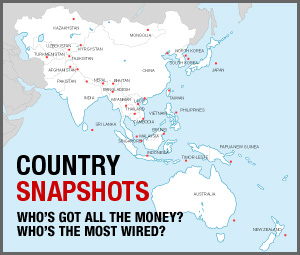China’s Not a Superpower 
 Image: Poeloq
Image: Poeloq
Another obstacle to China’s future growth lies in the country’s export-led growth model. As a middle-income country with limited domestic demand, China has relied on exports to increase its growth. While this strategy, which has been employed successfully in East Asia, has served China well for the past two decades, its future viability is now deeply in doubt. As the world’s second largest exporter (although China is expected to surpass Germany as the world’s largest exporter in 2010), China is encountering protectionist resistance in its major markets (the United States and Europe). In particular, China’s policy of maintaining an under-valued currency to keep its exports competitive is now being blamed for worsening global imbalances and weakening the economies of its trading partners.
Unlike its East Asian neighbours, which are relatively small trading powers, China’s sheer size means it has the capacity to cause severe economic disruptions to its trading partners. Unless the Chinese government abandons its mercantilist strategy, a global backlash against Chinese exports can’t be ruled out. Because net export growth has provided China at least an extra two percentage points growth over the past five years, a slowdown in China’s exports in the future will mean an overall lower rate of growth. To be sure, China can compensate for the loss of its external demand by increasing domestic consumption. But this process requires a complete overhaul of China’s growth strategy, a politically difficult and painful step the incumbent government has been unable to take.
A third constraint on China’s future growth is environmental degradation. Over the past three decades, China has neglected its environment for the sake of economic growth, with disastrous consequences. Today, air and water pollution kills about 750,000 people a year. The aggregate costs of pollution are roughly 8 percent of the GDP. Official estimates suggest that mitigating environmental degradation requires an investment of an additional 1.5 percent of GDP each year. Climate change will severely affect China’s water supplies and exacerbate the drought in the north. China’s business-as-usual approach to growth, which relies on cheap energy and no-cost pollution, will no longer be sustainable.
Uncertain economic prospects aside, China’s rise to superpower status will also be constrained by a host of political factors. First and foremost, Chinese leaders will find themselves in search of a global vision and a political mission. Countries don’t become superpowers merely because they have acquired hard power. The exercise of power must be informed by ideas and visions that have universal appeal. The United States did not become a true superpower until it entered the Second World War, even though it had attained all the requisite elements of a superpower long before Pearl Harbor. The political challenge for China in the future is whether it will be able to find the political ideals and visions to guide the use of its power. At the moment, China is economically prosperous but ideologically bankrupt. It believes in neither communism nor liberal democracy. Besides depriving China of a source of soft power, the lack of appealing ideals and visions for the world is also responsible for the inward-looking mindset of the Chinese leadership, which has so far paid only lip service to calls for China to assume greater international responsibility.
Unlike the United States, China will find its capacity to exercise power abroad greatly constrained by the lack of political integration at home. The Chinese Communist Party may have defied the doomsayers who repeatedly exaggerated its demise in the past. But the party’s political monopoly is by no means secure. It holds on to its power by both delivering satisfactory economic performance and repressing challengers to its authority. As Chinese society grows more sophisticated and autonomous, the party will find it increasingly difficult to deny the rights of political participation to the urban middle-class. As a one-party regime, the Communist Party has also fallen victim to internal corruption. The combination of political challenge from the rising middle-class and progressive internal decay will increase the probability of a regime change in the future, a process that’s likely to be disruptive, even cataclysmic.










